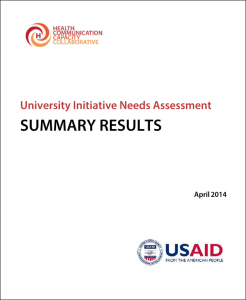HC3 Assessment of 26 Asian and African University Faculty Finds 24% Engaged in SBCC Practices
 The Health Communication Capacity Collaborative (HC3) recently reached out to 59 university faculty members in 18 countries in Africa and Asia. The purpose? To assess and identify current areas of strength and opportunity for growth in social and behavior change communication (SBCC) education, research and practice, both institutionally and individually. HC3 is hoping to expand the role that universities and training institutes play in local and regional health communication practice, teaching and research.
The Health Communication Capacity Collaborative (HC3) recently reached out to 59 university faculty members in 18 countries in Africa and Asia. The purpose? To assess and identify current areas of strength and opportunity for growth in social and behavior change communication (SBCC) education, research and practice, both institutionally and individually. HC3 is hoping to expand the role that universities and training institutes play in local and regional health communication practice, teaching and research.
Twenty-six university faculty completed the survey. They represent 21 universities in 12 countries—Cote d’Ivoire, Ethiopia, Ghana, Mozambique, Nigeria, Swaziland, Tanzania, Zambia, Bangladesh, India, Indonesia and Thailand—and hold positions in public health, media/communications and social sciences degree programs.
Key findings suggest faculty spend more than half of their time teaching and about a quarter of their time on research. Only 24 percent engaged in SBCC practice. A few regional differences were also found—Asian universities may offer a slightly more comprehensive curricula—and only one university reported offering online instruction, the Tata Institute of Social Sciences, School of Health Systems Studies, in India.
The assessment also revealed limited funding available to universities for journal subscriptions and conference travel, and limited connections to local and regional networks of SBCC practitioners.
The results demonstrate a clear need to foster a network of local, regional and international SBCC communities for universities through a few key activities, such as:
- Facilitating and supporting student internships with SBCC programs.
- Supporting a faculty research innovation grant competition each year.
- Using the Springboard for Health Communication to connect faculty and students with existing or new country projects, as well as sharing resources.
- Working with communication organizations around the world (e.g., AfriComNet and the International Communication Association (ICA) to develop national, regional and international academic SBCC networks.







Leave a Reply
Want to join the discussion?Feel free to contribute!